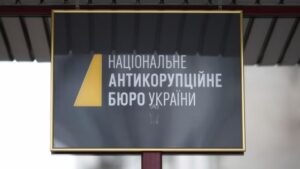
Corruption in the energy sector is systemic and long-standing. Since 2022, the National Anti-Corruption Bureau (NABU) and the Specialized Anti-Corruption Prosecutor’s Office (SAP) have been investigating five high-profile cases in the energy sector, according to anti-corruption authorities.
On Tuesday, NABU and SAP posted an infographic on criminal cases in the energy sector on their Telegram channel, which, in particular, highlights the Energoatom case with losses to the state of UAH 100 million, which is currently being considered in court, and the Ukrenergo case, with losses of UAH 600 million, which is also at the stage of judicial review.
In addition, the completion of the pre-trial investigation of the Kharkivoblenergo case, with losses to the state amounting to UAH 12.6 million, and the court’s consideration of the case of bribery by the Deputy Minister of Energy are mentioned, as well as the Energoatom case on kickbacks from contractors, which is still under investigation.
“Not just Midas: 5 high-profile cases of NABU and SAP in the energy sector since 2022,” the anti-corruption authorities said in a statement.
“The criminal organization that was exposed during Operation Midas is only part of a much bigger problem. Corruption in Ukraine’s energy sector is systemic and long-standing. NABU and SAP cases in this area cover various levels: from direct bribery in the ministry to large-scale market manipulation and theft of resources at state-owned enterprises,” NABU and SAP note.
The statement notes that anti-corruption agencies continue to consistently expose these crimes regardless of the political context or the names of those involved. “Cases are brought to court, and new challenges receive an immediate response. The work to clean up one of the most strategic and at the same time most corrupt industries will continue in the future,” NABU and SAP assure.

According to Serbian Economist, Croatia has expressed its readiness to consider buying Serbian oil and gas company Naftna Industrija Srbije (NIS) if it will help to settle the consequences of US sanctions against the company, Croatian Economy Minister Ante Šušnjar said.
“Our hand is outstretched – if this is the solution, we are ready for this option as well,” the minister said, commenting on the situation after the US sanctions against NIS came into force.
According to Šušnjar, if such a scenario is realized, Croatia would guarantee the stability of the Jadranski naftovod (JANAF) oil pipeline, which has been cooperating with NIS for more than 40 years, without interfering in Serbia’s retail fuel market.
“This would simplify the situation both for us and for Serbia,” emphasized the minister, who represents the Domovinski pokret party, which is in coalition with Prime Minister Andrej Plenkovic’s ruling HDZ party.
The minister noted that the NIS Pančevo refinery provides up to 20% of Bosnia and Herzegovina’s oil products market, and the current sanctions situation poses additional challenges for the entire region.
“By the end of the month, we will complete the modernization of the refinery in Rijeka, which will allow us to increase refining capacity and thus help Bosnia and Herzegovina, and partially Serbia,” Šušnjar said.
He also emphasized that sanctions against NIS will not affect Croatia’s position in negotiations with Hungarian MOL on oil supplies. According to him, the country is ready to provide sufficient volumes of fuel for Hungary, Slovakia and Serbia when it is possible in terms of geopolitical conditions.
Experts note that Croatia’s possible participation in the fate of NIS could be a compromise option to stabilize the energy market in the Balkans and ensure uninterrupted operation of the JANAF oil pipeline, which is a key link of oil supplies to the region.

Nova Poshta, the leader in express delivery in Ukraine, has launched the first of seven gas-fired cogeneration gas piston units planned for installation by 2025.
“A new stage in the implementation of the energy independence program has begun: the first gas piston cogeneration unit with an electrical capacity of 1 MW has started operating at the company’s hub (Nova Poshta – IF-U) in western Ukraine. Six more CCGs are currently being installed and are expected to be commissioned this year, including in Kyiv,” Nova Poshta’s press service reported on Tuesday on Telegram.
The company’s CHP units will generate electricity and heat from natural gas.
According to the report, Nova Poshta has invested a total of UAH 300 million in energy independence and plans to invest another UAH 150 million in 2025. More than half of the total investment of UAH 450 million will go toward gas generation.
Earlier it was reported that Nova Poshta’s energy company (NOVA group) – Nova Energy – became an electricity trader after receiving a license from the NEURC.
Nova Poshta founded the energy company Nova Energy in April 2023 to develop regular electricity generation and ensure the autonomy of the company’s facilities in connection with Russia’s attacks on the energy system. Since August, the company has been engaged in small-scale wholesale sales of diesel fuel on the open market.
Co-owner of Nova Poshta Volodymyr Poperechnyuk announced plans to install industrial uninterruptible power supply systems and energy storage equipment to increase the efficiency of energy capacities.
He also stated that after the end of the war and the improvement of the energy supply situation, Nova Energy will be sold as a non-core business.
It was reported that Nova Poshta had installed a second solar power plant (SPP) at its terminal in Kyiv and plans to increase its capacity to 1.4 MW. Nova Poshta’s first 1 MW SPP was commissioned in January at the Kyiv Innovation Terminal, located on its roof.

On behalf of Foreign Minister Antonio Tajani, Italy has allocated EUR 13 million to the Energy Support Fund for Ukraine.
“At a time when attacks on Ukraine’s energy infrastructure are intensifying, this decision is an important step in efforts to restore energy systems damaged by the conflict. Italy’s contribution – one of the largest for a single country – will help stabilize the supply of electricity to millions of war-affected Ukrainians in this difficult time,” the Italian Foreign Ministry said on its website.
It is noted that with this contribution, Italy confirms its continued support for the resilience of Ukraine’s energy sector, in particular in connection with the conference on Ukraine’s recovery to be held in Rome next July.

Norway, in partnership with the United Nations Development Program (UNDP), has committed a total of NOK 1.1 billion ($105 million) in financial support to rebuild Ukraine’s energy infrastructure, build backup capacity and accelerate Ukraine’s transition to a more diversified and sustainable energy mix.
“This partnership will ensure the restoration of energy generating capacity in Ukraine, providing direct support to important regions of Ukraine. This contribution will significantly mitigate the impact of the ongoing shelling of Ukraine’s energy infrastructure. As part of this enhanced partnership, solar panels will be installed to provide backup power to schools and hospitals, and a recent agreement will provide an additional 80 MW of power to the national grid this winter,” the UN press service reports.
It is noted that thanks to the UNDP Energy Recovery Program, the provision of heat and water will meet the needs of more than a million people and industrial consumers.
“Russia’s constant attacks on Ukraine’s energy infrastructure have led to an urgent need to increase electricity production. There is a shortage of this type of equipment on the market. Therefore, the agreement with UNDP is very important to support Ukraine this winter,” Norwegian Foreign Minister Espen Barth Eide said in a government press release.
The production, transportation and installation of energy equipment are complex and risky processes that are carried out by reliable partners, as this is vital assistance that will enable Ukraine to survive the coming winter.
“We are committed to supporting Ukraine in its efforts to build a more resilient and sustainable energy system by restoring critical energy infrastructure and generation capacity, and advancing strategic initiatives to accelerate the transition to green energy. We are committed to supporting Ukraine in its efforts to build a more resilient and sustainable energy system. Rehabilitating critical energy infrastructure is essential as people living in multi-storey buildings in major cities have no alternative means of heating and water supply. UNDP’s Renewable Energy Program, through which we are supporting Ukraine’s energy recovery, is a testament to our commitment to promoting green recovery and energy security for all Ukrainians. We are grateful to our partners for their continued support,” said UNDP Resident Representative Jaco Silje.

France will provide Ukraine with at least EUR60 million by the end of this year, according to Pierre Elbrun, the French President’s Special Envoy for Ukraine’s Relief and Recovery.
“As winter approaches, the situation is becoming critical – we must act now to quickly offer concrete energy solutions,” he wrote on social media X following a meeting of the G7+ Ministerial Group on Energy Support to Ukraine at the level of foreign ministers on the sidelines of the 79th session of the UN General Assembly on Monday evening.
At the meeting, U.S. Secretary of State Anthony Blinken noted that the G7+ countries have mobilized more than $4 billion to support Ukraine’s energy sector since the start of Russia’s full-scale invasion.
In a statement following the G7+ ministerial meeting, the countries welcome further commitments of funding and in-kind support to cover the most urgent needs of the Ukrainian energy sector, including repairing damaged power plants and district heating systems, deploying new, distributed energy sources, emergency backup power for critical services, and passive protection of energy infrastructure.